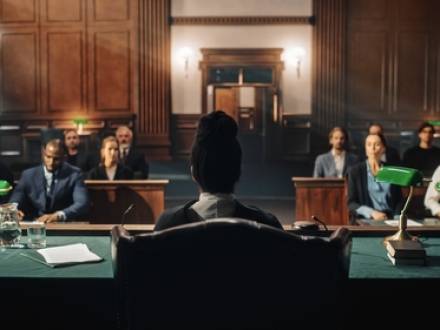Recent Blog Posts
Can You Get Divorced in Illinois Without Going to Court?
 Divorce does not always have to involve a courtroom battle. In fact, despite what TV and film divorces portray, most divorces today do not involve litigation. Many couples in Illinois are choosing alternative paths that allow them to end their marriage with less conflict. In turn, this makes divorce less expensive and gives spouses more control over the outcome.
Divorce does not always have to involve a courtroom battle. In fact, despite what TV and film divorces portray, most divorces today do not involve litigation. Many couples in Illinois are choosing alternative paths that allow them to end their marriage with less conflict. In turn, this makes divorce less expensive and gives spouses more control over the outcome.
If you and your spouse are willing to work together, it may be possible to complete your divorce largely outside of court. However, it is important to understand what "staying out of court" really means. Likewise, having an experienced divorce attorney is still important, even in an uncontested or mediated divorce. To learn more, call the Yorkville divorce attorneys with Goostree Law Group.
What Does It Mean to Get Divorced Without Going to Court?
In Illinois, every divorce must be approved by a judge. However, that does not necessarily mean you will need to appear in court or go through a trial. Most divorces in 2025 are resolved outside of the courtroom, with the couple and their attorneys negotiating the terms privately. Once both parties agree on all major issues, the judge simply reviews and signs off on the final agreement.
Why Some Couples Choose Legal Separation Over Divorce
 Filing for divorce is one of the most serious and final decisions most people make in their lives. Even when spouses realize that they are unhappy together, they may not be totally sure that they want to end their marriage completely. For those who are unsure about whether divorce is the right step, legal separation can serve as a meaningful alternative.
Filing for divorce is one of the most serious and final decisions most people make in their lives. Even when spouses realize that they are unhappy together, they may not be totally sure that they want to end their marriage completely. For those who are unsure about whether divorce is the right step, legal separation can serve as a meaningful alternative.
In Illinois, legal separation allows a couple to live apart and set up boundaries while technically staying married. This option gives people time and structure to decide whether reconciliation is possible or whether a divorce should eventually follow. Some people simply stay legally separated forever.
If you are wondering whether legal separation is a path you may be interested in, contact our DuPage County family lawyers today.
What Is Legal Separation in Illinois?
Under Illinois law (750 ILCS 5/402), legal separation allows married spouses to live apart. Separated spouses can ask for a court order addressing issues such as property division, parenting responsibilities, child support, and alimony. Unlike divorce, however, legal separation does not end the marriage. A couple remains legally married and cannot remarry unless they later get officially divorced.
What to Expect at Your First Divorce Court Hearing in Illinois
 The first time you appear in court for your divorce can feel intimidating. Your first divorce court appearance sets the tone for how the rest of your case will go, and you may not know what to wear, how to act, what will happen, or how long it will take. Understanding what to expect, both legally and logistically, can make the experience far less stressful.
The first time you appear in court for your divorce can feel intimidating. Your first divorce court appearance sets the tone for how the rest of your case will go, and you may not know what to wear, how to act, what will happen, or how long it will take. Understanding what to expect, both legally and logistically, can make the experience far less stressful.
As of October 2025, Illinois divorce cases continue to follow the procedures outlined in the Illinois Marriage and Dissolution of Marriage Act. While every county has its own local rules, the process in DuPage County generally follows a predictable sequence. The more you understand before you arrive, the more confident you will feel when you stand before the judge. Our Wheaton divorce attorneys can prepare you for your first hearing and for everything that happens before and after.
What Protections Does a Disabled Person Receive in a Divorce?
 The decision to divorce can be even more difficult than usual if you have a disability. Although you may be unhappy in your marriage, you may also worry about how you will manage to support yourself after a divorce. You may rely on your spouse’s income and health insurance if you are unable to work or are limited because of your condition.
The decision to divorce can be even more difficult than usual if you have a disability. Although you may be unhappy in your marriage, you may also worry about how you will manage to support yourself after a divorce. You may rely on your spouse’s income and health insurance if you are unable to work or are limited because of your condition.
If you have children, you are probably wondering whether your disability will mean you get limited parenting time. However, you should not have to feel trapped in an unhealthy marriage just because you deal with a disability. Illinois divorce laws can help support you financially and protect your parental rights. Understanding these protections is key to achieving a fair outcome.
From spousal maintenance and healthcare coverage to guardianship and property division, Illinois statutes and case law provide extra safeguards to preserve a disabled spouse’s independence and dignity. Consulting with an experienced Kane County, IL divorce lawyer can help ensure that your future is protected.
What is an "Ironclad" Prenup?
 Many engaged couples want to start their marriage on strong financial footing, but few enjoy discussing what might happen if the relationship ends. Still, creating a prenuptial agreement — often called a "prenup" — can provide peace of mind for both parties. A well-drafted prenup does not only plan for divorce; it sets clear expectations about finances, debt, and property during the marriage itself. But what makes a prenup truly "ironclad" and legally enforceable in Illinois?
Many engaged couples want to start their marriage on strong financial footing, but few enjoy discussing what might happen if the relationship ends. Still, creating a prenuptial agreement — often called a "prenup" — can provide peace of mind for both parties. A well-drafted prenup does not only plan for divorce; it sets clear expectations about finances, debt, and property during the marriage itself. But what makes a prenup truly "ironclad" and legally enforceable in Illinois?
At Goostree Law Group, our Wheaton, IL family lawyers help couples write solid prenuptial agreements. We focus on your goals, interests, and Illinois law. Call us today to get started.
What Exactly Is a Prenup?
A prenuptial agreement is a legal contract entered into by two people before marriage. Its main purpose is to outline how assets, debts, and financial responsibilities will be handled during the marriage and in divorce or death.
Do Grandparents Have Rights to Visitation with Their Grandchildren in Illinois?
 For many families, the relationship between grandparents and their grandchildren means everything. When parents have a hard time getting along, their children may spend more time with grandparents and rely on them for support.
For many families, the relationship between grandparents and their grandchildren means everything. When parents have a hard time getting along, their children may spend more time with grandparents and rely on them for support.
In some situations, the dynamics of a family can deteriorate to the point where the child is no longer allowed to maintain that relationship with his or her grandparent. In Illinois, parents have automatic legal rights to spend time with their children. Grandparents do not have the same rights, but Illinois laws do give grandparents the ability to ask the court for visitation time in certain situations.
If you are a grandparent in Illinois who has not been able to see your grandchild because of conflict with the parents, call a Kane County, IL grandparents’ custody rights lawyer.
Can a Father Refuse to Sign the Birth Certificate to Get Out of Child Support?
 In Illinois, both parents have a legal responsibility to support their children. Child support is meant to make sure that a child’s needs are met, whether or not the parents are married or living together. Many fathers have questions about when support payments begin. They may also wonder how paternity is established, and whether they can avoid having to pay child support if they do not sign the birth certificate.
In Illinois, both parents have a legal responsibility to support their children. Child support is meant to make sure that a child’s needs are met, whether or not the parents are married or living together. Many fathers have questions about when support payments begin. They may also wonder how paternity is established, and whether they can avoid having to pay child support if they do not sign the birth certificate.
The short answer is no. Refusing to sign a birth certificate does not mean a biological father does not have to pay child support. Illinois law gives children the right to financial support from both parents, and that right cannot be waived because one parent does not want to pay or to claim the child.
At Goostree Law Group, our Kane County family law attorneys help clients navigate tough questions of paternity, custody, and support. With decades of combined experience, we know how to protect both your rights and your child’s best interests.
Should You File for Divorce Together or Separately?
 When a marriage ends, many couples find themselves wondering how exactly they should begin the divorce process. In Illinois, divorce begins with the filing of a petition for dissolution of marriage. Some people ask whether they should file for divorce together with their spouse, as a "joint action," or if one spouse should file separately. The answer depends on your situation, your ability to work together, and what you want the process to look like.
When a marriage ends, many couples find themselves wondering how exactly they should begin the divorce process. In Illinois, divorce begins with the filing of a petition for dissolution of marriage. Some people ask whether they should file for divorce together with their spouse, as a "joint action," or if one spouse should file separately. The answer depends on your situation, your ability to work together, and what you want the process to look like.
Deciding how to file is an important step that can affect everything from how much a divorce costs to how long it takes. Since Illinois family law has changed a lot in recent years, especially after major changes in 2016, understanding your options can help you start on the right foot. Call our Wheaton, IL divorce lawyers today to learn which type of filing is right for you.
Are Arranged Marriages More or Less Likely to End in Divorce?
 Depending on your cultural background, the idea of an arranged marriage might feel outdated, unfamiliar, or even surprising. However, for some, arranged marriages are a completely normal, respected, and even expected tradition. While it may seem like an old-world concept in the United States, arranged marriages remain common across the world. Divorce statistics from these marriages raise important questions about stability and expectations in marriage.
Depending on your cultural background, the idea of an arranged marriage might feel outdated, unfamiliar, or even surprising. However, for some, arranged marriages are a completely normal, respected, and even expected tradition. While it may seem like an old-world concept in the United States, arranged marriages remain common across the world. Divorce statistics from these marriages raise important questions about stability and expectations in marriage.
Sometimes, people who come from cultures that do not have arranged marriages idealize the idea of having a partner chosen for you by the people who know you best. The truth is, whatever strategy you use to get married, a happy marriage is no guarantee. If you are living in Illinois and are thinking about divorce, you may be wondering whether the statistics on arranged marriages have anything to say about your own situation. Getting to the bottom of how many arranged marriages last is more complicated than just looking at the numbers.
What is Sole Custody and is it Possible in Illinois?
 Parents facing divorce or separation in Illinois hear terms like "custody," "parenting time," and "decision-making responsibilities." These phrases carry enormous weight, because they determine how a child will be raised and how much influence each parent will have in that process. One question that parents often have is whether sole custody is possible in Illinois and, if so, what it means in practice.
Parents facing divorce or separation in Illinois hear terms like "custody," "parenting time," and "decision-making responsibilities." These phrases carry enormous weight, because they determine how a child will be raised and how much influence each parent will have in that process. One question that parents often have is whether sole custody is possible in Illinois and, if so, what it means in practice.
As of September 2025, Illinois family law continues to use the relatively new term of "allocation of parental responsibilities" in the Illinois Marriage and Dissolution of Marriage Act (750 ILCS 5/600). While the word "custody" is still used in everyday conversation, Illinois law now divides this larger topic into two key categories: parenting time and decision-making. Sole custody is possible, but it looks different under modern law than many parents expect.












